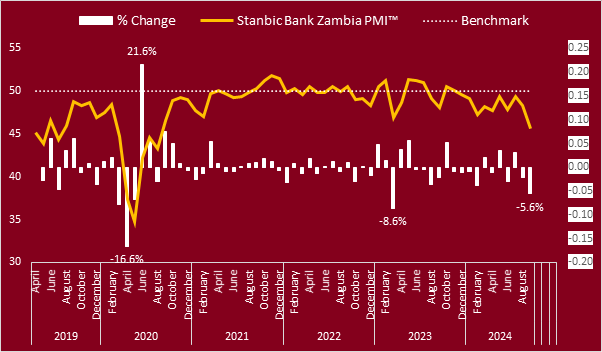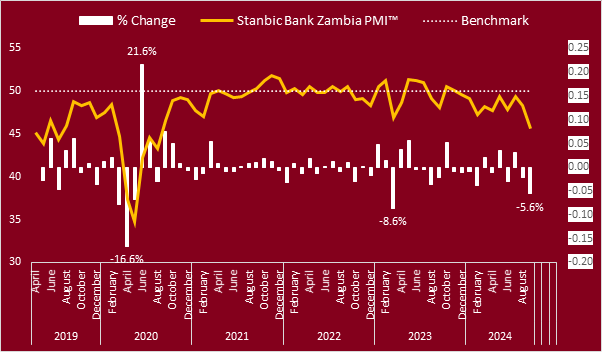ZAMBIA'S PURCHASING MANAGERS INDEX TAKES A HIT
8 OCTOBER 2024 : 12:00AM
Gerald Hamuyayi

Zambia is plagued by one of the worst energy crises ever, culminating in more than 20 hours of power blackouts. As the country struggles with a deficit of around 1,300MW, Zambia's private sector businesses have borne the brunt, with the PMI reading for September nose-diving to a record 45.6, down from 48.3 in August. This marks the worst PMI reading recorded since the COVID-19 era reading of 43.3 in August 2020 and the sharpest decline of the index since March 2023.
Stanbic Zambia's Purchasing Managers Index (PMI) is a barometer of the private sector's business pulse. The PMI is the headline weighted average of five business indices, covering agriculture, mining, manufacturing, construction, wholesale, retail, and services sectors, proportionate to their contributions to GDP. These indices encompass various business metrics, including new orders, output, employment, delivery times, and inventory. A PMI reading above 50 indicates expansionary private business conditions, while readings below 50 signal contraction.
The September PMI reading of 45.6 hovers in the contractionary zone, below the 50 no-change benchmark. Business conditions have remained in contractionary territory for 10 straight months, with the last expansion recorded in November 2023 Additionally, the September PMI declined 5.6%, compared to a 2.2% decline in August. This represents the worst deterioration since the 8.6% decline in March 2023. As capacity remains under-optimised, firms have reduced their employment numbers, with some implementing retrenchments to cut costs. The figure below illustrating trends in the Stanbic Bank Zambia PMI.

The survey findings reveal that Zambia's power outages have significantly impacted businesses, limiting output as facilities operate below optimal capacity. Random power cuts interrupt operations, resulting in the sharpest rise in work backlogs since January 2020. Rising supplier and energy costs have driven up business input costs. Consequently, end consumers face increased price pressures as businesses raise prices to maintain margins, fuelling inflationary pressures in the economy.
At the Energy Regulation Board's Zesco Emergency Tariff hearing on October 7, 2024, business leaders highlighted the significant impact of power challenges on their operations. Specifically, they noted that alternative power sources, such as diesel generators, have inflated energy costs to 50 US cents per KWh, substantially eroding profit margins.
Despite the myriad economic shocks, the Zambian private sector remains optimistic about prospects for a stable exchange rate and resolution of the energy crisis. Zambia is exploring the procurement of an additional 300MW of power through its state utility's application, currently under review by the Energy Regulation Board. This initiative aims to increase power supply to up to 7 hours a day. However, it could also exacerbate exchange rate pressures.
Featured Image
2024-10-08
Category: Economic & Business Sectors
